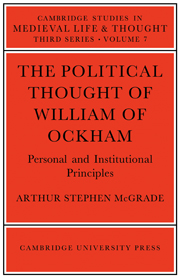Book contents
- Frontmatter
- Contents
- Preface
- Abbreviations
- 1 OCKHAM AS A POLITICAL THINKER
- 2 THE PROBLEM OF RADICAL ACTION
- 3 THEORY OF INSTITUTIONS: SECULAR AND SPIRITUAL GOVERNMENT
- 4 POLITICS AND PHILOSOPHY: NATURAL RIGHT AND THE ETHICAL BASIS FOR OCKHAM'S POLITICAL IDEAS
- 5 POLITICS AND THEOLOGY: SECULAR POLITICS AND CHRISTIAN VIRTUE
- CONCLUSION: OCKHAM AS A CONSTRUCTIVE POLITICAL THINKER
- Bibliography
- Index of passages in Ockham quoted, discussed, or cited
- Index of names
- Subject index
1 - OCKHAM AS A POLITICAL THINKER
Published online by Cambridge University Press: 16 October 2009
- Frontmatter
- Contents
- Preface
- Abbreviations
- 1 OCKHAM AS A POLITICAL THINKER
- 2 THE PROBLEM OF RADICAL ACTION
- 3 THEORY OF INSTITUTIONS: SECULAR AND SPIRITUAL GOVERNMENT
- 4 POLITICS AND PHILOSOPHY: NATURAL RIGHT AND THE ETHICAL BASIS FOR OCKHAM'S POLITICAL IDEAS
- 5 POLITICS AND THEOLOGY: SECULAR POLITICS AND CHRISTIAN VIRTUE
- CONCLUSION: OCKHAM AS A CONSTRUCTIVE POLITICAL THINKER
- Bibliography
- Index of passages in Ockham quoted, discussed, or cited
- Index of names
- Subject index
Summary
‘There seems to be no way round Ockham. Sooner or later he confronts every worker in late medieval history.’ Unfortunately, Ockham seems not only unavoidable but also enigmatic. He has been seen as the destroyer of the high scholastic synthesis of faith and reason, yet his personal orthodoxy has seldom been questioned in recent times, and the avowed target of his critical attacks was the ‘common opinion of the moderns’ rather than traditional theological systems. He was involved in a literary war with the popes at Avignon that rivaled in length and bitterness any previous contest between empire and papacy, yet he has also been described as ‘a constitutional liberal… not an anti-papal zealot’. If we restrict our attention to the content of Ockham's political writings and consider his life, his speculative thought, and the world around him only as they clarify the inner structure and meaning of these works, difficulties still remain in even outlining our subject, let alone providing a finished account. Indeed, it has proved so hard to mark off the politically significant elements in Ockham's gigantic body of writings that some scholars have doubted he was a political thinker at all. We may begin with this problem, which is both important in itself and connected with other issues.
A nominal definition of Ockham's political work is easy to give: it consists of those treatises that have appeared or are to appear in the edition of his Opera Politica which will include nothing that he wrote at Oxford or Avignon and everything, with the exception of two logical treatises, that he is known to have written in his twenty years at Munich.
- Type
- Chapter
- Information
- The Political Thought of William Ockham , pp. 1 - 46Publisher: Cambridge University PressPrint publication year: 1974

